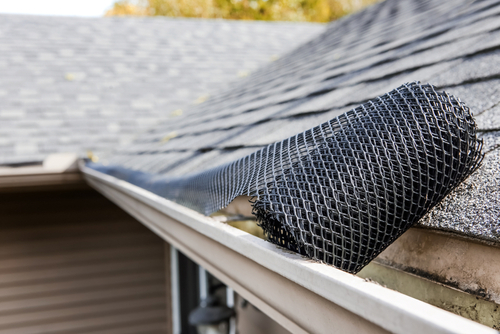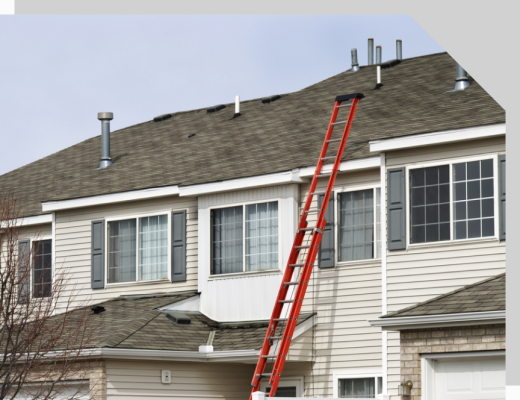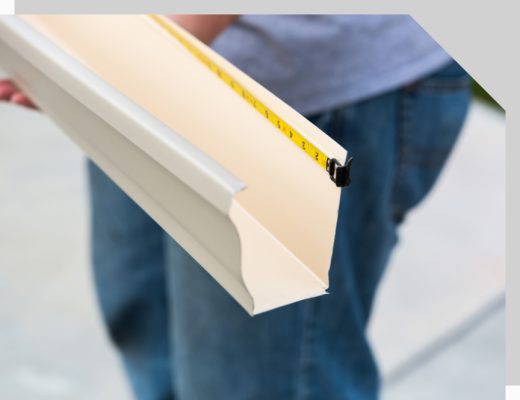Protect Your Home from Water Damage with Gutter Guards
If you’re a homeowner or property owner, you know water damage can be a nightmare, causing expensive repairs and potentially harmful mold growth. Gutters are an essential component of any home’s roofing system, responsible for directing rainwater away from the structure to prevent water damage. However, gutters can easily become clogged with leaves, twigs, debris, and other pollutants, leading to blockages and potential damage to your property.
One of the ways to protect your home from water damage is by installing gutter guards. Learn all about gutter guard systems from our expert Maryland gutter contractors at Thunder Bay Roofing by calling 410-956-7663.

What Are Gutter Guards?
Gutter guards, also known as gutter covers or gutter screens, are protective systems installed over the opening of gutters to prevent debris from entering while allowing water to flow freely through them. They’re typically made from various materials, such as aluminum, vinyl, steel, or mesh. Gutter guards can help you save time and money by reducing the need to clean your gutters frequently.
Benefits of Gutter Guards
Installing gutter guards can offer several benefits to your home, such as:
- Prevents Water Damage: Gutter guards keep your gutter system free of debris, ensuring proper water flow and preventing water damage to your home’s foundation, walls, and roof.
- Reduces Gutter Maintenance: With gutter guards in place, you’ll spend less time cleaning your gutters, which can be a time-consuming and dangerous task.
- Preventing Pests: Clogged gutters can become a breeding ground for pests like mosquitoes, rodents, and birds. Gutter guards prevent debris buildup, reducing the likelihood of a pest infestation.
- Improves Home Value: Gutter guards can add value to your home, making it more attractive to potential buyers.
- Reduced Risk of Ice Dams: In cold climates, ice dams can form on your roof when melted snow refreezes at the edge of the roof. Gutter guards can help prevent ice dams from forming by allowing water to flow freely through the gutters.
For the best gutter guards in Maryland, contact our roofing contractors today at 410-956-7663 for a free estimate.

Types of Gutter Guards
Mesh Gutter Guards
Mesh gutter guards are made from a fine mesh that allows water to pass through but keeps out debris. They’re relatively inexpensive and easy to install, but they can clog with heavy debris and may not be suitable for areas with a lot of leaves.
Micro-Mesh Gutter Guards
Micro-mesh gutter guards are made from a very fine mesh that can block even the smallest debris particles. They’re a good option for homes in areas with a lot of leaves or other debris, but they can be more expensive than other types.
Brush Gutter Guards
Brush gutter guards have bristles that filter out debris while allowing water to flow through. They’re less likely to clog than mesh gutter guards, but they may need to be cleaned more frequently.
Reverse Curve Gutter Guards
Reverse curve gutter guards work by using the principle of water adhesion. They’re installed at an angle that causes water to curve around them and flow into the gutter while debris falls off the edge.
Foam Gutter Guards
Foam gutter guards are made of porous plastic foam that fits inside the gutter, allowing water to flow through while blocking debris. They’re easy to install and can be cut to fit different gutter sizes. However, they may require more frequent replacement.
Solid Gutter Guards
A solid gutter guard is made from a solid material, such as aluminum or vinyl. They’re the most effective type of gutter guard at keeping out debris, but they can also block water flow and may not be suitable for all climates.
Choosing the Best Gutter Guard
When choosing the best type of gutter guard for your home or building, consider the following:
- The type of debris in your area: If you live in an area with a lot of leaves, you’ll need a gutter guard that can effectively block them.
- Your climate: If you live in a cold climate, choose gutter guards that won’t contribute to ice dam formation.
- Your budget: Gutter guards can range in price from a few dollars per linear foot to several dollars per linear foot.
- Your DIY skills: Some gutter guards are easier to install than others.
How to Install Gutter Guards
Installing gutter guards can be a DIY project, but it’s recommended to hire a professional if you’re not comfortable working on ladders or roofs. Here are the general steps to install gutter guards:
- Clean your existing gutter system thoroughly to remove any debris.
- Measure the length of the gutters to determine how much gutter guard material you’ll need.
- Cut the gutter guards to size using a hacksaw or tin snips.
- Install the gutter guards by sliding them under the shingles and attaching them to the gutter using screws or clips.
- Ensure that the gutter guards are secure and that water can flow freely through the gutter.
For professional installation, contact our Maryland roofing company. We offer all types of services, from gutter cleaning to gutter guard installation to other roofing services.

Frequently Asked Questions
Yes, gutter guards still need to be cleaned periodically, but the frequency is significantly reduced compared to gutters without guards. How often you need to clean them depends on the type of gutter guard and the amount of debris in your area.
The cost of gutter guards can vary depending on the type, quality, and size of your home’s existing gutters. On average, gutter guards can range from $2 to $10 per linear foot, with installation costs adding $1 to $3 per foot. It’s best to get a quote from a professional installer to get an accurate estimate for your specific needs.
No, gutter guards will not prevent all debris from entering the gutters. Some small debris, like pine needles and seeds, may still get through. However, the amount of debris that enters the gutter is significantly reduced, reducing the likelihood of clogs and water damage.
Most gutter guards are designed to be compatible with a variety of gutter types, but it’s best to check the specific guard you’re interested in to ensure it will work with your gutters. Some types of gutters may require specialized guards or installation methods, so it’s important to do your research before purchasing.
